Unit 6 When was it invented?单元复习学案【人教(2024秋)九全英语】
文档属性
| 名称 | Unit 6 When was it invented?单元复习学案【人教(2024秋)九全英语】 |
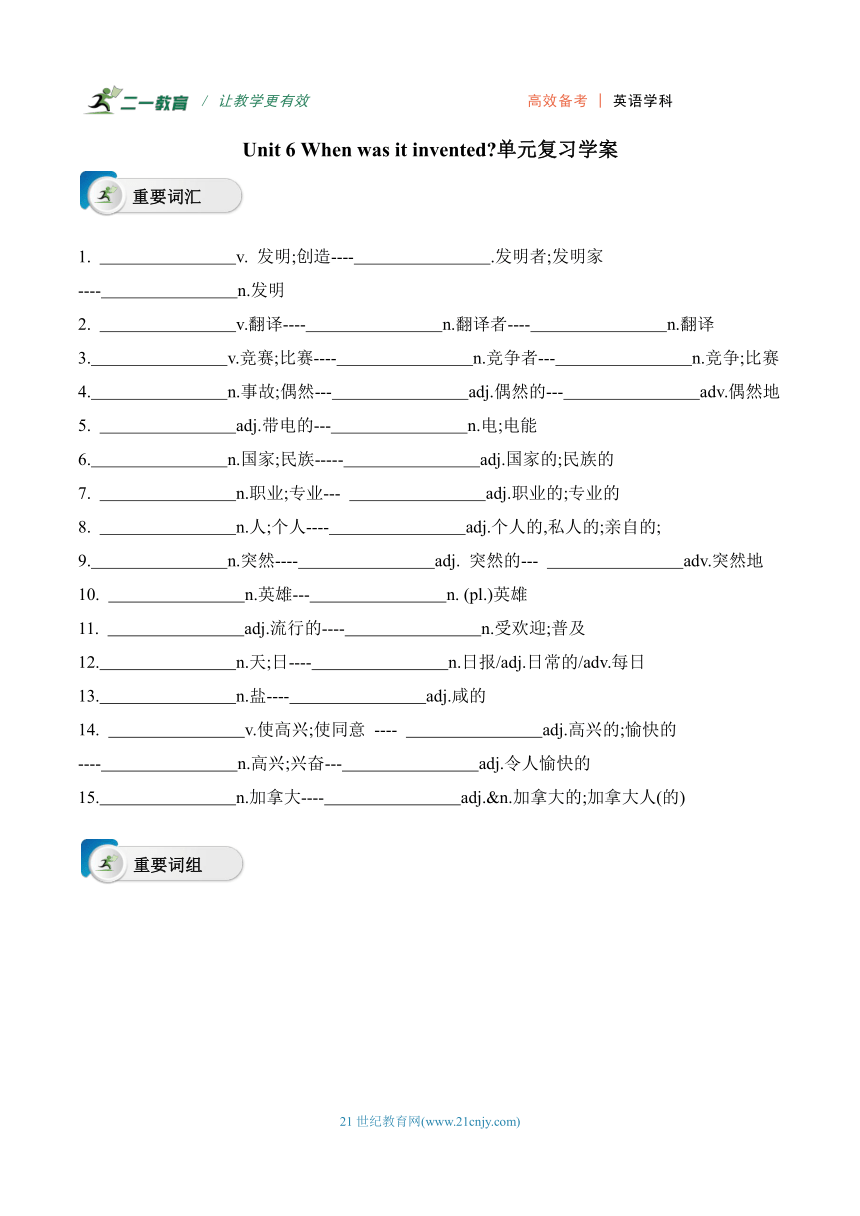
|
|
| 格式 | doc | ||
| 文件大小 | 424.5KB | ||
| 资源类型 | 试卷 | ||
| 版本资源 | 人教新目标(Go for it)版 | ||
| 科目 | 英语 | ||
| 更新时间 | 2024-11-27 00:00:00 | ||
图片预览

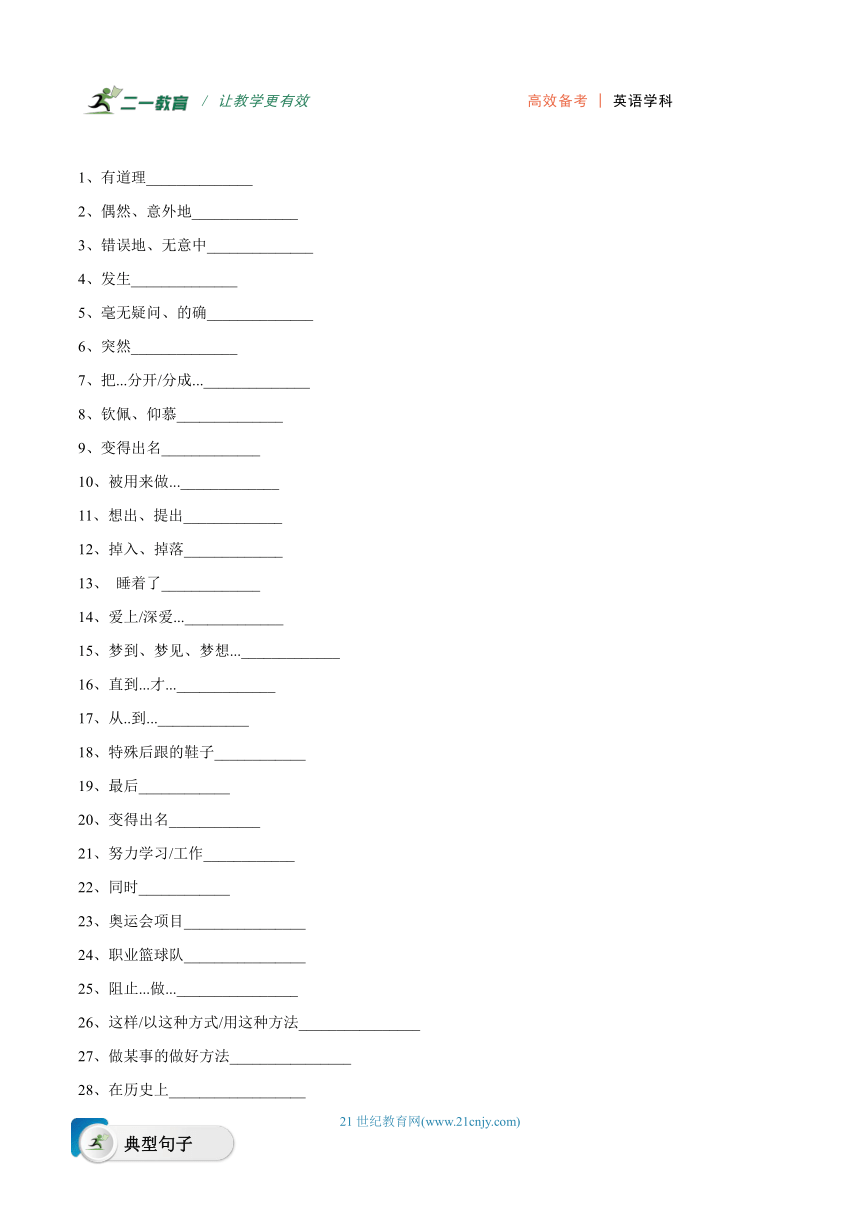
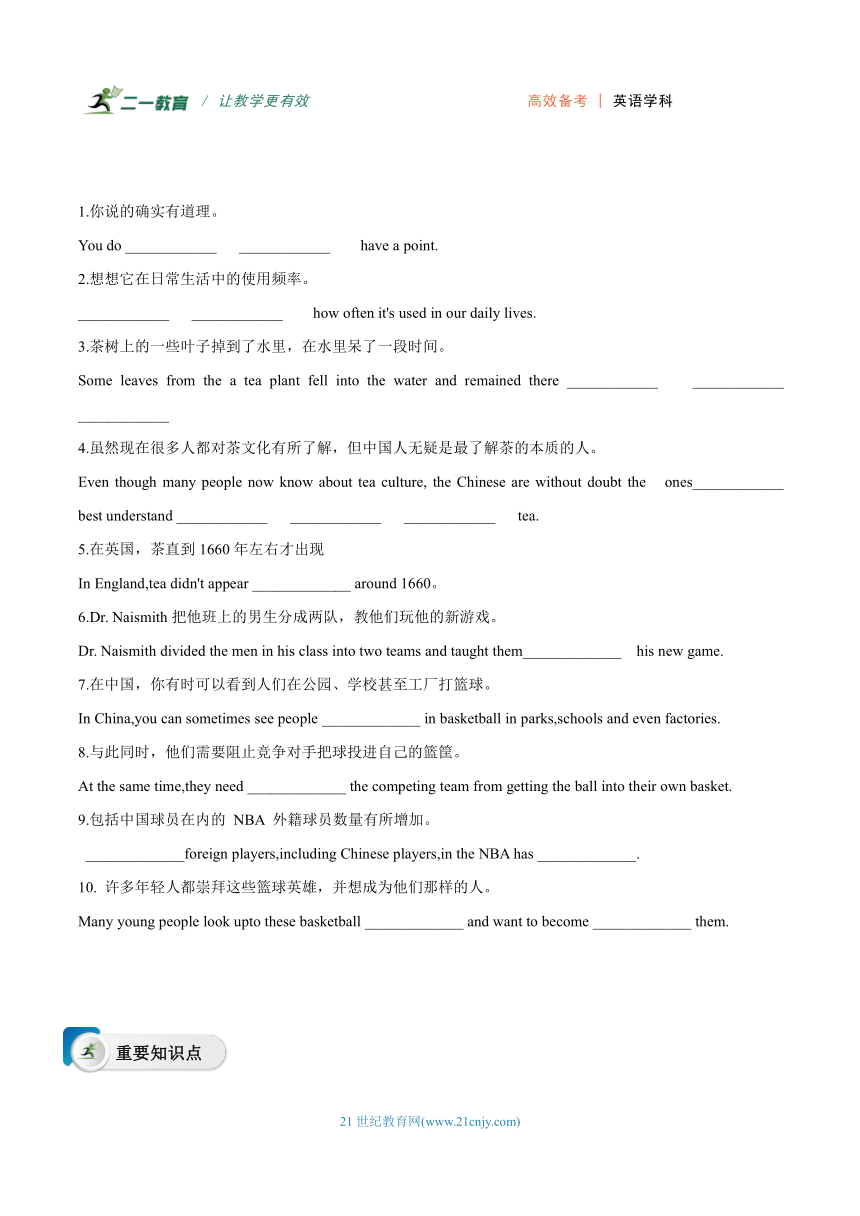
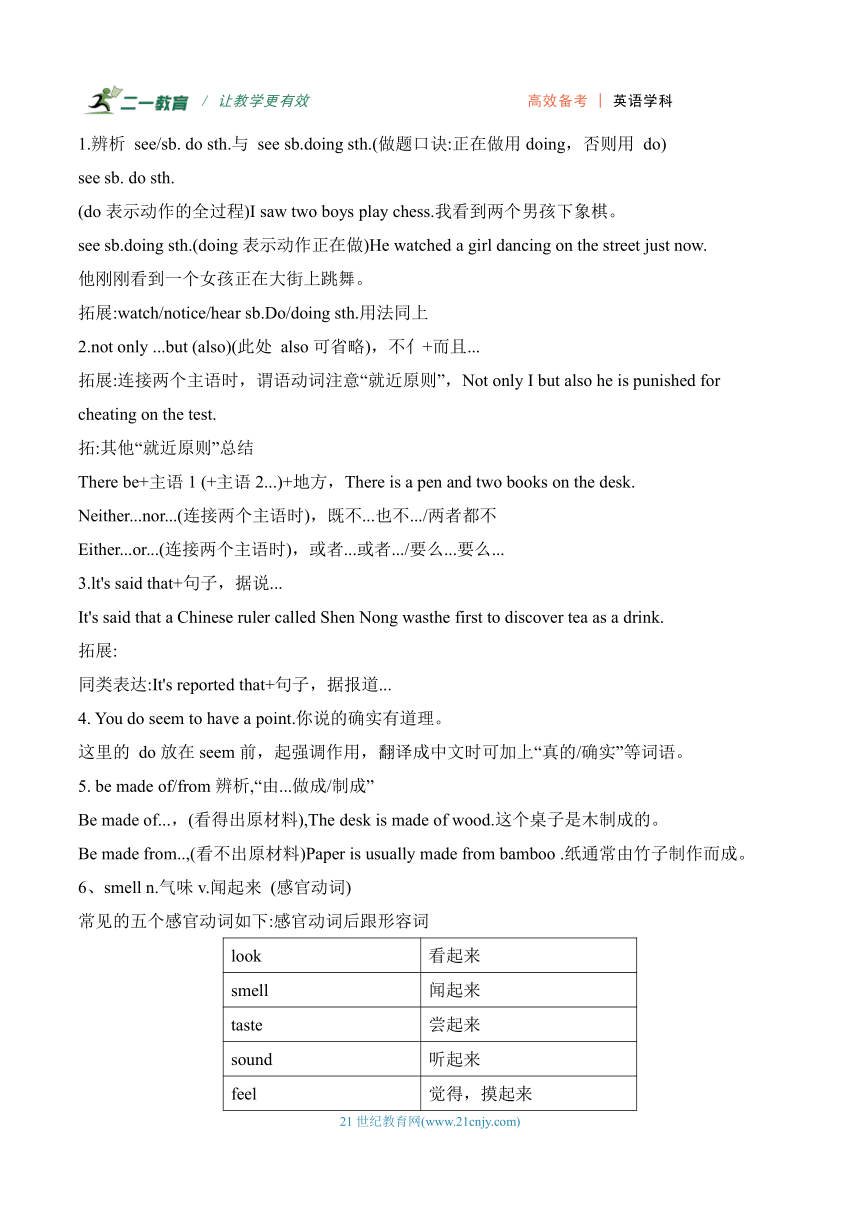
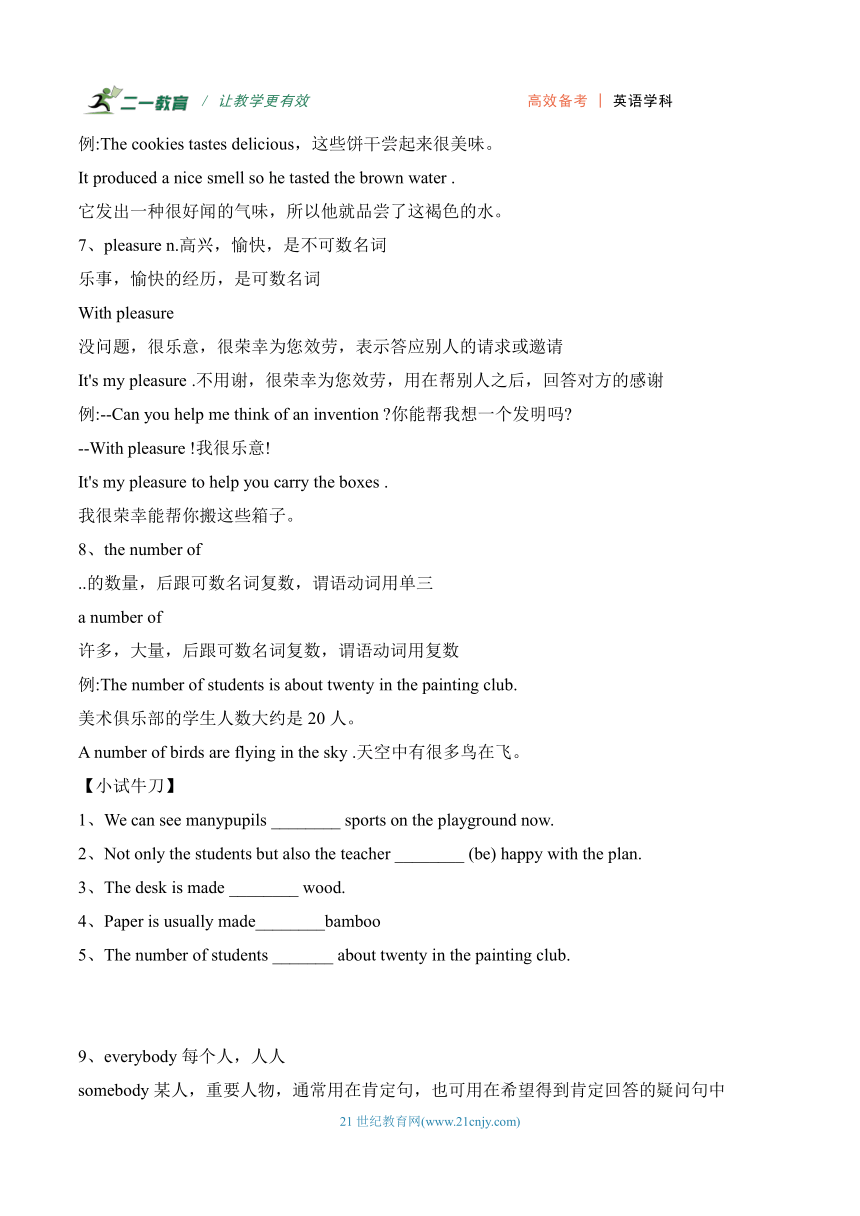
文档简介
/ 让教学更有效 高效备考 | 英语学科
Unit 6 When was it invented 单元复习学案
1. v. 发明;创造---- .发明者;发明家
---- n.发明
2. v.翻译---- n.翻译者---- n.翻译
3. v.竞赛;比赛---- n.竞争者--- n.竞争;比赛
4. n.事故;偶然--- adj.偶然的--- adv.偶然地
5. adj.带电的--- n.电;电能
6. n.国家;民族----- adj.国家的;民族的
7. n.职业;专业--- adj.职业的;专业的
8. n.人;个人---- adj.个人的,私人的;亲自的;
9. n.突然---- adj. 突然的--- adv.突然地
10. n.英雄--- n. (pl.)英雄
11. adj.流行的---- n.受欢迎;普及
12. n.天;日---- n.日报/adj.日常的/adv.每日
13. n.盐---- adj.咸的
14. v.使高兴;使同意 ---- adj.高兴的;愉快的
---- n.高兴;兴奋--- adj.令人愉快的
15. n.加拿大---- adj.&n.加拿大的;加拿大人(的)
1、有道理______________
2、偶然、意外地______________
3、错误地、无意中______________
4、发生______________
5、毫无疑问、的确______________
6、突然______________
7、把...分开/分成...______________
8、钦佩、仰慕______________
9、变得出名_____________
10、被用来做..._____________
11、想出、提出_____________
12、掉入、掉落_____________
13、 睡着了_____________
14、爱上/深爱..._____________
15、梦到、梦见、梦想..._____________
16、直到...才..._____________
17、从..到...____________
18、特殊后跟的鞋子____________
19、最后____________
20、变得出名____________
21、努力学习/工作____________
22、同时____________
23、奥运会项目________________
24、职业篮球队________________
25、阻止...做...________________
26、这样/以这种方式/用这种方法________________
27、做某事的做好方法________________
28、在历史上__________________
1.你说的确实有道理。
You do ____________ ____________ have a point.
2.想想它在日常生活中的使用频率。
____________ ____________ how often it's used in our daily lives.
3.茶树上的一些叶子掉到了水里,在水里呆了一段时间。
Some leaves from the a tea plant fell into the water and remained there ____________ ____________ ____________
4.虽然现在很多人都对茶文化有所了解,但中国人无疑是最了解茶的本质的人。
Even though many people now know about tea culture, the Chinese are without doubt the ones____________ best understand ____________ ____________ ____________ tea.
5.在英国,茶直到1660年左右才出现
In England,tea didn't appear _____________ around 1660。
6.Dr. Naismith把他班上的男生分成两队,教他们玩他的新游戏。
Dr. Naismith divided the men in his class into two teams and taught them_____________ his new game.
7.在中国,你有时可以看到人们在公园、学校甚至工厂打篮球。
In China,you can sometimes see people _____________ in basketball in parks,schools and even factories.
8.与此同时,他们需要阻止竞争对手把球投进自己的篮筐。
At the same time,they need _____________ the competing team from getting the ball into their own basket.
9.包括中国球员在内的 NBA 外籍球员数量有所增加。
_____________foreign players,including Chinese players,in the NBA has _____________.
10. 许多年轻人都崇拜这些篮球英雄,并想成为他们那样的人。
Many young people look upto these basketball _____________ and want to become _____________ them.
1.辨析 see/sb. do sth.与 see sb.doing sth.(做题口诀:正在做用doing,否则用 do)
see sb. do sth.
(do表示动作的全过程)I saw two boys play chess.我看到两个男孩下象棋。
see sb.doing sth.(doing表示动作正在做)He watched a girl dancing on the street just now.
他刚刚看到一个女孩正在大街上跳舞。
拓展:watch/notice/hear sb.Do/doing sth.用法同上
2.not only ...but (also)(此处 also可省略),不亻+而且...
拓展:连接两个主语时,谓语动词注意“就近原则”,Not only I but also he is punished for
cheating on the test.
拓:其他“就近原则”总结
There be+主语1 (+主语2...)+地方,There is a pen and two books on the desk.
Neither...nor...(连接两个主语时),既不...也不.../两者都不
Either...or...(连接两个主语时),或者...或者.../要么...要么...
3.lt's said that+句子,据说...
It's said that a Chinese ruler called Shen Nong wasthe first to discover tea as a drink.
拓展:
同类表达:It's reported that+句子,据报道...
4. You do seem to have a point.你说的确实有道理。
这里的 do放在seem前,起强调作用,翻译成中文时可加上“真的/确实”等词语。
5. be made of/from辨析,“由...做成/制成”
Be made of...,(看得出原材料),The desk is made of wood.这个桌子是木制成的。
Be made from..,(看不出原材料)Paper is usually made from bamboo .纸通常由竹子制作而成。
6、smell n.气味v.闻起来 (感官动词)
常见的五个感官动词如下:感官动词后跟形容词
look 看起来
smell 闻起来
taste 尝起来
sound 听起来
feel 觉得,摸起来
例:The cookies tastes delicious,这些饼干尝起来很美味。
It produced a nice smell so he tasted the brown water .
它发出一种很好闻的气味,所以他就品尝了这褐色的水。
7、pleasure n.高兴,愉快,是不可数名词
乐事,愉快的经历,是可数名词
With pleasure
没问题,很乐意,很荣幸为您效劳,表示答应别人的请求或邀请
It's my pleasure .不用谢,很荣幸为您效劳,用在帮别人之后,回答对方的感谢
例:--Can you help me think of an invention 你能帮我想一个发明吗
--With pleasure !我很乐意!
It's my pleasure to help you carry the boxes .
我很荣幸能帮你搬这些箱子。
8、the number of
..的数量,后跟可数名词复数,谓语动词用单三
a number of
许多,大量,后跟可数名词复数,谓语动词用复数
例:The number of students is about twenty in the painting club.
美术俱乐部的学生人数大约是20人。
A number of birds are flying in the sky .天空中有很多鸟在飞。
【小试牛刀】
1、We can see manypupils ________ sports on the playground now.
2、Not only the students but also the teacher ________ (be) happy with the plan.
3、The desk is made ________ wood.
4、Paper is usually made________bamboo
5、The number of students _______ about twenty in the painting club.
9、everybody每个人,人人
somebody某人,重要人物,通常用在肯定句,也可用在希望得到肯定回答的疑问句中
anybody任何人,没有一个人,用在否定句或疑问句中
nobody没有人,小人物,本身是否定词
例:Somebody stole my camera from my hotel room.
有人从我酒店的房间里偷走了我的照相机。
I knocked on the door but nobody answered.我敲了门,但无人应答。
She thinks she's really somebody in that car.
她以为,坐上那辆车,她就真成个人物了。
10、take place 发生,出现 表示发生的事情是计划好的,不能用于被动语态
happen 发生 表示偶然发生的事情,不能用于被动语态
What happened to sb/sth 某人或某物怎么了
例:The tea trade from China to Western countries took place in the 19th century.
从中国到西方国家的茶叶贸易出现于19世纪。
A big earthquake happened in Wenchuan on May 12,2008.
2008年5月12日汶川发生了一场大地震。
11、stop sb from doing sth = prevent sb from doing sth
阻止某人做某事
例:The heavy rain stopped us from arriving home on time.
大雨使我们未能按时回家。
【小试牛刀】
1、The activity will________ in front of the students’ flats。
2、When did the accident ________
3、The heavy rain stopped us from ________ home on time.
4、Look! Somebody ________ (swim) in the river.
5、_____________(anybody) is waiting for you at the school gate, Bill.
6、he comes into the office without greeting________ .
12、辩析:some time; sometimes ; some times ; sometime
①some time:名词短语,意为一段时间,常加延续性动词,提问用how long
②sometimes:频度副词,意为有时,表示动作发生的频率,提问用how often
③some times:名词短语,意为几次,times意为次、倍,提问用how many times
④sometime: adv,某时,表示不确切的时间,常用于过去时,将来时,提问用when
13.辨析: one, it与that
①one 泛指前文提到的那类人或物中的一个,即同类不同物,复数形式为ones
②it指代前文提到过的那个人或物,即同类同物,复数形式为they或them
③that 特指前文提到的单数可数名词或不可数名词,常用在比较的句子中,复数形式为those
14.over [介词]
①多于;超过=more than,用来说明数目和程度。
eg: He has translated over/more than 10 books in the last five years.近五年来他翻译了10多本书。
②在...上方
eg: The sign over the door said "Mind your head."门上方的警示牌上写着“小心碰头”。
③从(某物的)一边到另一边
eg: There is a stone bridge over the river.河上有一座石桥。
④遍及
eg: He travelled all over the world.他游遍了全世界。
⑤通过
eg: I often listen to the news over the radio.我经常通过收音机听新闻。
15.辨析: nearly与almost
两者均有“几乎;差不多”之意,有时可通用,具体区别如下:
①nearly可以和not连用,not nearly意为“远非,绝不是”nearly前的接近程度可用very pretty等词修饰
eg: We've saved some money, but it's not nearly enough.
我们存了一些钱,但还远远不够。
②almost: 可以和no,never, nothing等表示否定意义的词连用,但不与not连用
eg: I almost never see her.
我几乎从未见过她。
注意:almost表示的接近程度比 nearly大
1、Michelle's ________ twenty.
2、Have you ________ finished
3、My grandparents are ________90 years old, but they are still in good health
4、He travelled all________ the world
5、We have $500. Will________ be enough for a deposit
6、I ________ have to work late.
时态 被动结构 例句
一般现在时 am/ is / are + done The room is cleaned by him every day.这个房间每天都被打扫。
一般过去时 was / were + done The room was cleaned by him yesterday.这个房间昨天被他打扫了。
一般将来时 will / shall be + donebe going to be done The room will be cleaned by him tomorrow.这个房间明天被他打扫。
现在进行时 am / is / are + being +done The room is being cleaned by him now.房间现在正被他打扫。
现在完成时 have / has + been + done The room has already been cleaned by him .这个房间已经被他打扫过了。
情态动词 情态动词+be +done The room must be cleaned by him.这个房间肯定是被他打扫的。
常考的被动语态结构:
主动语态变被动语态
1.带双宾语的动词,只改其中一个宾语即可。
主动:My aunt gave me a bookyesterday.我姑姑昨天给我了一本书。
被动:I was given a book ( by my aunt ) yesterday.
被动:A book was given to me ( by my aunt ) yesterday.
2.省略 to 的不定式的被动形式,在主动句中,see, watch, hear, make, let等后面
直接跟动词的原形,改成被动语态后要把to 加上。
主动:We often hear him play the piano.我们经常听到他弹钢琴。
被动:He is often heard to play the piano.
3.动词短语的被动语态,不能丢掉动词短语的介词或副词。
主动:We should take good care of the children.我们应该好好照顾这些孩子。
被动:The children should be taken good care of .这些孩子应该被好好照顾。
4.带复合宾语的动词改被动语态(动词+宾语+宾语补足语)
只需把宾语变为被动语态的主语,而宾语补足语仍保留原处。
We always keep the classroom clean.我们总是保持教室干净。
The classroom is always kept clean ( by us ).
被动语态使用的场合
1.不知道或没有必要指出动作的执行者,常省略by短语。
This watch is made in China.这块手表是在中国制造的。
2、需要强调动作的承受者。
These songs were recorded by my father.这些歌曲是我爸爸录制的。
3.动作的发出者不是人而是物时。
Many houses were washed away by the flood.许多房屋被洪水冲走了。
4.文章标题,广告,新闻等常用省略be的被动语态。
Girls wanted.招聘女工。
主动表被动
1.感官系动词look, smell, taste, feel, sound等,用主动表被动意义。
The dishes taste delicious.这些菜肴尝起来很美味。
2.cut, read, wash, sell, wear, write等作不及物动词和well, easily, smoothly等连用
时,用主动表被动意义。
The book sells well.这本书卖的很好。
3. be worth + doing表示值得,用主动表被动。
His suggestion is worth considering.他的建议值得考虑。
4. want doing / need doing / require doing,表示需要..
= want to be done / need to be done / require to be done
The room needs cleaning. = The room needs to be cleaned.这个房间需要打扫。
“苟日新,日日新,又日新”古有四大发明,今有科技创新,从造纸术、指南针到移动支付、高速铁路,以及生活中常见的篮球、电视、手表等,都给我们的生活带来了改变和便利,学校正在举办科技节,请你以”My Favorite Invention为题写一则演讲稿,从发明、使用、喜欢的理由等方面介绍你最喜欢的发明,提示问题如下:
What is your favorite invention
What is it used for
Why do you like it best
Something more you want to say.
写作方法指导与操练
第一步:确定时态、人称,介绍自己最喜欢的发明及其用途;
________________________________________________________________
________________________________________________________________
第二步:介绍自己喜欢该发明的原因;
________________________________________________________________
________________________________________________________________
第三步:介绍更多有关该发明的信息,如该发明的意义及影响等。
________________________________________________________________
________________________________________________________________
联想:写作本篇作文可能用到的词汇、短语:
①fit in适合
②serve as用作
③browse the internet浏览互联网
④stay connected with...和..保持联系
[高分句型]
①It's a gateway to endless possibilities and a tool that enhances our lives in numerous ways.(that引导定语从句)
范文:
Do you have your favorite invention I do. My favorite invention is the smartphone, a versatile device that fits in our pockets and connects us to the world. It serves as a communication tool, entertainment center, and personal assistant, allowing us to message, call,browse the internet, take photos, and manage finances. I love smartphones because they make my life convenient and efficient, enabling me to stay connected with loved ones, access information instantly, and handle tasks on-the-go. They also help preserve memories and facilitate learning through access to educational materials and courses. Despite concerns about screen time and privacy, the smart phone's benefits are immense when used responsibly. It's a gateway to endless possibilities and a tool that enhances our lives in numerous ways.
参考答案
课堂同步
重要词汇
1. invent v. 发明;创造----inventor.发明者;发明家----invention n.发明
2. translate v.翻译----translator n.翻译者----translation n.翻译
3.compete v.竞赛;比赛----competitor n.竞争者---competition n.竞争;比赛
4.accident n.事故;偶然---accidental adj.偶然的---accidentally adv.偶然地
5. electric adj.带电的---electricity n.电;电能
6.nation n.国家;民族-----national adj.国家的;民族的
7. profession n.职业;专业--- professional adj.职业的;专业的
8. person n.人;个人----personal adj.个人的,私人的;亲自的;
9.sudden n.突然----sudden adj. 突然的--- suddenly adv.突然地
10. hero n.英雄---heroes n. (pl.)英雄
11. popular adj.流行的----popularity n.受欢迎;普及
12.day n.天;日----daily n.日报/adj.日常的/adv.每日
13.salt n.盐----salty adj.咸的
14. please v.使高兴;使同意 ---- pleased adj.高兴的;愉快的----pleasure n.高兴;兴奋---pleasant adj.令
人愉快的
15.Canada n.加拿大----Canadian adj.&n.加拿大的;加拿大人(的)
重要短语
1、have a point有道理
2、by accident 偶然、意外地
3、by mistake 错误地、无意中
4、take place 发生
5、Without doubt毫无疑问、的确
6、all of a sudden突然
7、divide ...into...,把...分开/分成...
8、look up to 钦佩、仰慕
9、become famous变得出名
10、be used for +名/doing=be used to do sth.被用来做...
11、come up with想出、提出
12、fall into 掉入、掉落
13、fall asleep 睡着了
14、fall in love with爱上/深爱...
15、dream of+名词/doing,梦到、梦见、梦想...
16、not...until..., 直到...才...
17、from...to...,从..到...
18、shoes with special heels特殊后跟的鞋子
19、in the end 最后
20、become famous变得出名
21、work hard 努力学习/工作
22、at the same time同时
23、the Olympic event奥运会项目
24、professional basketball group职业篮球队
25、stop...from doing..., 阻止...做...
26、in this way这样/以这种方式/用这种方法
27、the best way to do做某事的做好方法
28、in history在历史上
重要句型
1.You do seem to have a point.你说的确实有道理。
2.Think about how often it's used in our daily lives.想想它在日常生活中的使用频率。
3.Some leaves from the a tea plant fell into the water and remained there for some time.茶树上
的一些叶子掉到了水里,在水里呆了一段时间。
4.Even though many people now know about tea culture, the Chinese are without doubt the ones who best understand the nature of tea.
虽然现在很多人都对茶文化有所了解,但中国人无疑是最了解茶的本质的人。
5.In England,tea didn't appear until around 1660。
在英国,茶直到1660年左右才出现
6.Dr. Naismith divided the men in his class into two teams and taught them to play his new game.
Dr. Naismith把他班上的男生分成两队,教他们玩他的新游戏。
7.In China,you can sometimes see people playing in basketball in parks,schools and even factories.在中国,你有时可以看到人们在公园、学校甚至工厂打篮球。
8.At the same time,they need to stop the competing team from getting the ball into their own basket.与此同时,他们需要阻止竞争对手把球投进自己的篮筐。
9.The number of foreign players,including Chinese players,in theNBA has increased.包括中国球员在内的 NBA 外籍球员数量有所增加。
10. Many young people look up to these basketball heroes and want to become like them.
许多年轻人都崇拜这些篮球英雄,并想成为他们那样的人。
重要知识点
1、doing
2、is
3、of
4、from
5、is
1、take place
2、happen
3、arriving
4、 is swimming
5、Somebody
6、anybody
1、nearly
2、almost
3、over
4、over
5、it
6、sometimes
范文:
Do you have your favorite invention I do. My favorite invention is the smartphone, a versatile device that fits in our pockets and connects us to the world. It serves as a communication tool, entertainment center, and personal assistant, allowing us to message, call,browse the internet, take photos, and manage finances. I love smartphones because they make my life convenient and efficient, enabling me to stay connected with loved ones, access information instantly, and handle tasks on-the-go. They also help preserve memories and facilitate learning through access to educational materials and courses. Despite concerns about screen time and privacy, the smart phone's benefits are immense when used responsibly. It's a gateway to endless possibilities and a tool that enhances our lives in numerous ways
重要词汇
重要词组
典型句子
重要知识点
语法复习
写作复习
HYPERLINK "http://21世纪教育网(www.21cnjy.com)
" 21世纪教育网(www.21cnjy.com)
Unit 6 When was it invented 单元复习学案
1. v. 发明;创造---- .发明者;发明家
---- n.发明
2. v.翻译---- n.翻译者---- n.翻译
3. v.竞赛;比赛---- n.竞争者--- n.竞争;比赛
4. n.事故;偶然--- adj.偶然的--- adv.偶然地
5. adj.带电的--- n.电;电能
6. n.国家;民族----- adj.国家的;民族的
7. n.职业;专业--- adj.职业的;专业的
8. n.人;个人---- adj.个人的,私人的;亲自的;
9. n.突然---- adj. 突然的--- adv.突然地
10. n.英雄--- n. (pl.)英雄
11. adj.流行的---- n.受欢迎;普及
12. n.天;日---- n.日报/adj.日常的/adv.每日
13. n.盐---- adj.咸的
14. v.使高兴;使同意 ---- adj.高兴的;愉快的
---- n.高兴;兴奋--- adj.令人愉快的
15. n.加拿大---- adj.&n.加拿大的;加拿大人(的)
1、有道理______________
2、偶然、意外地______________
3、错误地、无意中______________
4、发生______________
5、毫无疑问、的确______________
6、突然______________
7、把...分开/分成...______________
8、钦佩、仰慕______________
9、变得出名_____________
10、被用来做..._____________
11、想出、提出_____________
12、掉入、掉落_____________
13、 睡着了_____________
14、爱上/深爱..._____________
15、梦到、梦见、梦想..._____________
16、直到...才..._____________
17、从..到...____________
18、特殊后跟的鞋子____________
19、最后____________
20、变得出名____________
21、努力学习/工作____________
22、同时____________
23、奥运会项目________________
24、职业篮球队________________
25、阻止...做...________________
26、这样/以这种方式/用这种方法________________
27、做某事的做好方法________________
28、在历史上__________________
1.你说的确实有道理。
You do ____________ ____________ have a point.
2.想想它在日常生活中的使用频率。
____________ ____________ how often it's used in our daily lives.
3.茶树上的一些叶子掉到了水里,在水里呆了一段时间。
Some leaves from the a tea plant fell into the water and remained there ____________ ____________ ____________
4.虽然现在很多人都对茶文化有所了解,但中国人无疑是最了解茶的本质的人。
Even though many people now know about tea culture, the Chinese are without doubt the ones____________ best understand ____________ ____________ ____________ tea.
5.在英国,茶直到1660年左右才出现
In England,tea didn't appear _____________ around 1660。
6.Dr. Naismith把他班上的男生分成两队,教他们玩他的新游戏。
Dr. Naismith divided the men in his class into two teams and taught them_____________ his new game.
7.在中国,你有时可以看到人们在公园、学校甚至工厂打篮球。
In China,you can sometimes see people _____________ in basketball in parks,schools and even factories.
8.与此同时,他们需要阻止竞争对手把球投进自己的篮筐。
At the same time,they need _____________ the competing team from getting the ball into their own basket.
9.包括中国球员在内的 NBA 外籍球员数量有所增加。
_____________foreign players,including Chinese players,in the NBA has _____________.
10. 许多年轻人都崇拜这些篮球英雄,并想成为他们那样的人。
Many young people look upto these basketball _____________ and want to become _____________ them.
1.辨析 see/sb. do sth.与 see sb.doing sth.(做题口诀:正在做用doing,否则用 do)
see sb. do sth.
(do表示动作的全过程)I saw two boys play chess.我看到两个男孩下象棋。
see sb.doing sth.(doing表示动作正在做)He watched a girl dancing on the street just now.
他刚刚看到一个女孩正在大街上跳舞。
拓展:watch/notice/hear sb.Do/doing sth.用法同上
2.not only ...but (also)(此处 also可省略),不亻+而且...
拓展:连接两个主语时,谓语动词注意“就近原则”,Not only I but also he is punished for
cheating on the test.
拓:其他“就近原则”总结
There be+主语1 (+主语2...)+地方,There is a pen and two books on the desk.
Neither...nor...(连接两个主语时),既不...也不.../两者都不
Either...or...(连接两个主语时),或者...或者.../要么...要么...
3.lt's said that+句子,据说...
It's said that a Chinese ruler called Shen Nong wasthe first to discover tea as a drink.
拓展:
同类表达:It's reported that+句子,据报道...
4. You do seem to have a point.你说的确实有道理。
这里的 do放在seem前,起强调作用,翻译成中文时可加上“真的/确实”等词语。
5. be made of/from辨析,“由...做成/制成”
Be made of...,(看得出原材料),The desk is made of wood.这个桌子是木制成的。
Be made from..,(看不出原材料)Paper is usually made from bamboo .纸通常由竹子制作而成。
6、smell n.气味v.闻起来 (感官动词)
常见的五个感官动词如下:感官动词后跟形容词
look 看起来
smell 闻起来
taste 尝起来
sound 听起来
feel 觉得,摸起来
例:The cookies tastes delicious,这些饼干尝起来很美味。
It produced a nice smell so he tasted the brown water .
它发出一种很好闻的气味,所以他就品尝了这褐色的水。
7、pleasure n.高兴,愉快,是不可数名词
乐事,愉快的经历,是可数名词
With pleasure
没问题,很乐意,很荣幸为您效劳,表示答应别人的请求或邀请
It's my pleasure .不用谢,很荣幸为您效劳,用在帮别人之后,回答对方的感谢
例:--Can you help me think of an invention 你能帮我想一个发明吗
--With pleasure !我很乐意!
It's my pleasure to help you carry the boxes .
我很荣幸能帮你搬这些箱子。
8、the number of
..的数量,后跟可数名词复数,谓语动词用单三
a number of
许多,大量,后跟可数名词复数,谓语动词用复数
例:The number of students is about twenty in the painting club.
美术俱乐部的学生人数大约是20人。
A number of birds are flying in the sky .天空中有很多鸟在飞。
【小试牛刀】
1、We can see manypupils ________ sports on the playground now.
2、Not only the students but also the teacher ________ (be) happy with the plan.
3、The desk is made ________ wood.
4、Paper is usually made________bamboo
5、The number of students _______ about twenty in the painting club.
9、everybody每个人,人人
somebody某人,重要人物,通常用在肯定句,也可用在希望得到肯定回答的疑问句中
anybody任何人,没有一个人,用在否定句或疑问句中
nobody没有人,小人物,本身是否定词
例:Somebody stole my camera from my hotel room.
有人从我酒店的房间里偷走了我的照相机。
I knocked on the door but nobody answered.我敲了门,但无人应答。
She thinks she's really somebody in that car.
她以为,坐上那辆车,她就真成个人物了。
10、take place 发生,出现 表示发生的事情是计划好的,不能用于被动语态
happen 发生 表示偶然发生的事情,不能用于被动语态
What happened to sb/sth 某人或某物怎么了
例:The tea trade from China to Western countries took place in the 19th century.
从中国到西方国家的茶叶贸易出现于19世纪。
A big earthquake happened in Wenchuan on May 12,2008.
2008年5月12日汶川发生了一场大地震。
11、stop sb from doing sth = prevent sb from doing sth
阻止某人做某事
例:The heavy rain stopped us from arriving home on time.
大雨使我们未能按时回家。
【小试牛刀】
1、The activity will________ in front of the students’ flats。
2、When did the accident ________
3、The heavy rain stopped us from ________ home on time.
4、Look! Somebody ________ (swim) in the river.
5、_____________(anybody) is waiting for you at the school gate, Bill.
6、he comes into the office without greeting________ .
12、辩析:some time; sometimes ; some times ; sometime
①some time:名词短语,意为一段时间,常加延续性动词,提问用how long
②sometimes:频度副词,意为有时,表示动作发生的频率,提问用how often
③some times:名词短语,意为几次,times意为次、倍,提问用how many times
④sometime: adv,某时,表示不确切的时间,常用于过去时,将来时,提问用when
13.辨析: one, it与that
①one 泛指前文提到的那类人或物中的一个,即同类不同物,复数形式为ones
②it指代前文提到过的那个人或物,即同类同物,复数形式为they或them
③that 特指前文提到的单数可数名词或不可数名词,常用在比较的句子中,复数形式为those
14.over [介词]
①多于;超过=more than,用来说明数目和程度。
eg: He has translated over/more than 10 books in the last five years.近五年来他翻译了10多本书。
②在...上方
eg: The sign over the door said "Mind your head."门上方的警示牌上写着“小心碰头”。
③从(某物的)一边到另一边
eg: There is a stone bridge over the river.河上有一座石桥。
④遍及
eg: He travelled all over the world.他游遍了全世界。
⑤通过
eg: I often listen to the news over the radio.我经常通过收音机听新闻。
15.辨析: nearly与almost
两者均有“几乎;差不多”之意,有时可通用,具体区别如下:
①nearly可以和not连用,not nearly意为“远非,绝不是”nearly前的接近程度可用very pretty等词修饰
eg: We've saved some money, but it's not nearly enough.
我们存了一些钱,但还远远不够。
②almost: 可以和no,never, nothing等表示否定意义的词连用,但不与not连用
eg: I almost never see her.
我几乎从未见过她。
注意:almost表示的接近程度比 nearly大
1、Michelle's ________ twenty.
2、Have you ________ finished
3、My grandparents are ________90 years old, but they are still in good health
4、He travelled all________ the world
5、We have $500. Will________ be enough for a deposit
6、I ________ have to work late.
时态 被动结构 例句
一般现在时 am/ is / are + done The room is cleaned by him every day.这个房间每天都被打扫。
一般过去时 was / were + done The room was cleaned by him yesterday.这个房间昨天被他打扫了。
一般将来时 will / shall be + donebe going to be done The room will be cleaned by him tomorrow.这个房间明天被他打扫。
现在进行时 am / is / are + being +done The room is being cleaned by him now.房间现在正被他打扫。
现在完成时 have / has + been + done The room has already been cleaned by him .这个房间已经被他打扫过了。
情态动词 情态动词+be +done The room must be cleaned by him.这个房间肯定是被他打扫的。
常考的被动语态结构:
主动语态变被动语态
1.带双宾语的动词,只改其中一个宾语即可。
主动:My aunt gave me a bookyesterday.我姑姑昨天给我了一本书。
被动:I was given a book ( by my aunt ) yesterday.
被动:A book was given to me ( by my aunt ) yesterday.
2.省略 to 的不定式的被动形式,在主动句中,see, watch, hear, make, let等后面
直接跟动词的原形,改成被动语态后要把to 加上。
主动:We often hear him play the piano.我们经常听到他弹钢琴。
被动:He is often heard to play the piano.
3.动词短语的被动语态,不能丢掉动词短语的介词或副词。
主动:We should take good care of the children.我们应该好好照顾这些孩子。
被动:The children should be taken good care of .这些孩子应该被好好照顾。
4.带复合宾语的动词改被动语态(动词+宾语+宾语补足语)
只需把宾语变为被动语态的主语,而宾语补足语仍保留原处。
We always keep the classroom clean.我们总是保持教室干净。
The classroom is always kept clean ( by us ).
被动语态使用的场合
1.不知道或没有必要指出动作的执行者,常省略by短语。
This watch is made in China.这块手表是在中国制造的。
2、需要强调动作的承受者。
These songs were recorded by my father.这些歌曲是我爸爸录制的。
3.动作的发出者不是人而是物时。
Many houses were washed away by the flood.许多房屋被洪水冲走了。
4.文章标题,广告,新闻等常用省略be的被动语态。
Girls wanted.招聘女工。
主动表被动
1.感官系动词look, smell, taste, feel, sound等,用主动表被动意义。
The dishes taste delicious.这些菜肴尝起来很美味。
2.cut, read, wash, sell, wear, write等作不及物动词和well, easily, smoothly等连用
时,用主动表被动意义。
The book sells well.这本书卖的很好。
3. be worth + doing表示值得,用主动表被动。
His suggestion is worth considering.他的建议值得考虑。
4. want doing / need doing / require doing,表示需要..
= want to be done / need to be done / require to be done
The room needs cleaning. = The room needs to be cleaned.这个房间需要打扫。
“苟日新,日日新,又日新”古有四大发明,今有科技创新,从造纸术、指南针到移动支付、高速铁路,以及生活中常见的篮球、电视、手表等,都给我们的生活带来了改变和便利,学校正在举办科技节,请你以”My Favorite Invention为题写一则演讲稿,从发明、使用、喜欢的理由等方面介绍你最喜欢的发明,提示问题如下:
What is your favorite invention
What is it used for
Why do you like it best
Something more you want to say.
写作方法指导与操练
第一步:确定时态、人称,介绍自己最喜欢的发明及其用途;
________________________________________________________________
________________________________________________________________
第二步:介绍自己喜欢该发明的原因;
________________________________________________________________
________________________________________________________________
第三步:介绍更多有关该发明的信息,如该发明的意义及影响等。
________________________________________________________________
________________________________________________________________
联想:写作本篇作文可能用到的词汇、短语:
①fit in适合
②serve as用作
③browse the internet浏览互联网
④stay connected with...和..保持联系
[高分句型]
①It's a gateway to endless possibilities and a tool that enhances our lives in numerous ways.(that引导定语从句)
范文:
Do you have your favorite invention I do. My favorite invention is the smartphone, a versatile device that fits in our pockets and connects us to the world. It serves as a communication tool, entertainment center, and personal assistant, allowing us to message, call,browse the internet, take photos, and manage finances. I love smartphones because they make my life convenient and efficient, enabling me to stay connected with loved ones, access information instantly, and handle tasks on-the-go. They also help preserve memories and facilitate learning through access to educational materials and courses. Despite concerns about screen time and privacy, the smart phone's benefits are immense when used responsibly. It's a gateway to endless possibilities and a tool that enhances our lives in numerous ways.
参考答案
课堂同步
重要词汇
1. invent v. 发明;创造----inventor.发明者;发明家----invention n.发明
2. translate v.翻译----translator n.翻译者----translation n.翻译
3.compete v.竞赛;比赛----competitor n.竞争者---competition n.竞争;比赛
4.accident n.事故;偶然---accidental adj.偶然的---accidentally adv.偶然地
5. electric adj.带电的---electricity n.电;电能
6.nation n.国家;民族-----national adj.国家的;民族的
7. profession n.职业;专业--- professional adj.职业的;专业的
8. person n.人;个人----personal adj.个人的,私人的;亲自的;
9.sudden n.突然----sudden adj. 突然的--- suddenly adv.突然地
10. hero n.英雄---heroes n. (pl.)英雄
11. popular adj.流行的----popularity n.受欢迎;普及
12.day n.天;日----daily n.日报/adj.日常的/adv.每日
13.salt n.盐----salty adj.咸的
14. please v.使高兴;使同意 ---- pleased adj.高兴的;愉快的----pleasure n.高兴;兴奋---pleasant adj.令
人愉快的
15.Canada n.加拿大----Canadian adj.&n.加拿大的;加拿大人(的)
重要短语
1、have a point有道理
2、by accident 偶然、意外地
3、by mistake 错误地、无意中
4、take place 发生
5、Without doubt毫无疑问、的确
6、all of a sudden突然
7、divide ...into...,把...分开/分成...
8、look up to 钦佩、仰慕
9、become famous变得出名
10、be used for +名/doing=be used to do sth.被用来做...
11、come up with想出、提出
12、fall into 掉入、掉落
13、fall asleep 睡着了
14、fall in love with爱上/深爱...
15、dream of+名词/doing,梦到、梦见、梦想...
16、not...until..., 直到...才...
17、from...to...,从..到...
18、shoes with special heels特殊后跟的鞋子
19、in the end 最后
20、become famous变得出名
21、work hard 努力学习/工作
22、at the same time同时
23、the Olympic event奥运会项目
24、professional basketball group职业篮球队
25、stop...from doing..., 阻止...做...
26、in this way这样/以这种方式/用这种方法
27、the best way to do做某事的做好方法
28、in history在历史上
重要句型
1.You do seem to have a point.你说的确实有道理。
2.Think about how often it's used in our daily lives.想想它在日常生活中的使用频率。
3.Some leaves from the a tea plant fell into the water and remained there for some time.茶树上
的一些叶子掉到了水里,在水里呆了一段时间。
4.Even though many people now know about tea culture, the Chinese are without doubt the ones who best understand the nature of tea.
虽然现在很多人都对茶文化有所了解,但中国人无疑是最了解茶的本质的人。
5.In England,tea didn't appear until around 1660。
在英国,茶直到1660年左右才出现
6.Dr. Naismith divided the men in his class into two teams and taught them to play his new game.
Dr. Naismith把他班上的男生分成两队,教他们玩他的新游戏。
7.In China,you can sometimes see people playing in basketball in parks,schools and even factories.在中国,你有时可以看到人们在公园、学校甚至工厂打篮球。
8.At the same time,they need to stop the competing team from getting the ball into their own basket.与此同时,他们需要阻止竞争对手把球投进自己的篮筐。
9.The number of foreign players,including Chinese players,in theNBA has increased.包括中国球员在内的 NBA 外籍球员数量有所增加。
10. Many young people look up to these basketball heroes and want to become like them.
许多年轻人都崇拜这些篮球英雄,并想成为他们那样的人。
重要知识点
1、doing
2、is
3、of
4、from
5、is
1、take place
2、happen
3、arriving
4、 is swimming
5、Somebody
6、anybody
1、nearly
2、almost
3、over
4、over
5、it
6、sometimes
范文:
Do you have your favorite invention I do. My favorite invention is the smartphone, a versatile device that fits in our pockets and connects us to the world. It serves as a communication tool, entertainment center, and personal assistant, allowing us to message, call,browse the internet, take photos, and manage finances. I love smartphones because they make my life convenient and efficient, enabling me to stay connected with loved ones, access information instantly, and handle tasks on-the-go. They also help preserve memories and facilitate learning through access to educational materials and courses. Despite concerns about screen time and privacy, the smart phone's benefits are immense when used responsibly. It's a gateway to endless possibilities and a tool that enhances our lives in numerous ways
重要词汇
重要词组
典型句子
重要知识点
语法复习
写作复习
HYPERLINK "http://21世纪教育网(www.21cnjy.com)
" 21世纪教育网(www.21cnjy.com)
同课章节目录
- Unit 1 How can we become good learners.
- Section A
- Section B
- Unit 2 I think that mooncakes are delicious!
- Section A
- Section B
- Unit 3 Could you please tell me where the restroom
- Section A
- Section B
- Unit 4 I used to be afraid of the dark.
- Section A
- Section B
- Unit 5 What are the shirts made of?
- Section A
- Section B
- Review of Units 1-5
- Unit 6 When was it invented?
- Section A
- Section B
- Unit 7 Teenagers should be allowed to choose their
- Section A
- Section B
- Unit 8 It must belong to Carla.
- Section A
- Section B
- Unit 9 I like music that I can dance to.
- Section A
- Section B
- Unit 10 You're supposed to shake hands.
- Section A
- Section B
- Review of Units 6-10
- Unit 11 Sad movies make me cry.
- Section A
- Section B
- Unit 12 Life is full of the unexpected
- Section A
- Section B
- Unit 13 We're trying to save the earth!
- Section A
- Section B
- Unit 14 I remember meeting all of you in Grade 7.
- Section A
- Section B
- Review of Units 11-14
